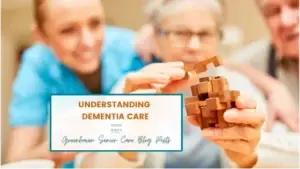
Understanding Dementia: Signs, Symptoms, and Early Interventions
Call (206) 801-7555 Or Contact Us for Room Availability, Pricing, or if you are a family member or friend of our residents. Dementia is a
Call (206) 259-5157 Or Contact Us for Room Availability, Pricing, or if you are a family member or friend of our residents.

Are you or your loved one in need of assisted care? Finding the perfect assisted care near you can be a daunting task. With so many options available, it’s essential to have a comprehensive guide to help you make informed decisions. In this article, we will provide you with all the information you need to find the perfect assisted care facility for seniors and their families.
From understanding different types of care options, such as independent living, assisted living, memory care, and skilled nursing, to evaluating the quality of care provided, we will cover it all. We will also discuss factors to consider when choosing a facility, including location, amenities, cost, and staff qualifications.
Whether you are researching assisted care options for yourself or your loved one, this guide will be your step-by-step resource to find the ideal facility that meets your unique needs. Let us help you navigate this important decision with confidence and ensure a comfortable and fulfilling living arrangement for your golden years.
When it comes to assisted care options, it’s important to understand the different types available. This knowledge will help you determine the level of care that best suits your needs or the needs of your loved one. The most common types of assisted care options include independent living, assisted living, memory care, and skilled nursing.
Independent living is ideal for seniors who are still active and do not require assistance with daily activities. These communities offer a range of amenities and social activities while providing a safe and supportive environment.
Assisted living, on the other hand, is designed for seniors who need help with activities of daily living, such as bathing, dressing, and medication management. Assisted living facilities offer personalized care plans and assistance tailored to each resident’s unique needs.
Memory care facilities specialize in caring for individuals with Alzheimer’s disease or other forms of dementia. These facilities have trained staff who provide specialized care and create a safe and stimulating environment for residents.
Skilled nursing facilities, also known as nursing homes, provide round-the-clock medical care and assistance to seniors who have complex medical conditions or require rehabilitation services. These facilities have licensed nurses and healthcare professionals on staff to meet the residents’ medical needs.
Understanding the different types of assisted care options will help you narrow down your search and find the facility that best suits your needs or the needs of your loved one.
Assisted care facilities offer numerous benefits for seniors and their families. One of the primary advantages is the availability of personalized care plans that cater to individual needs. Trained staff members are available to assist with activities of daily living, medication management, and other essential tasks, ensuring that seniors receive the support they require.
Assisted care facilities also provide a safe and secure environment for seniors. With staff available around the clock, residents can feel confident knowing that help is always just a call away. Additionally, these facilities often have security measures in place to prevent accidents and ensure the well-being of residents.
Another significant benefit of assisted care is the opportunity for socialization and community engagement. Many facilities offer a variety of activities, events, and outings to keep residents active and engaged. These social interactions can improve the overall well-being and mental health of seniors, reducing feelings of loneliness and isolation.
Furthermore, assisted care facilities often provide housekeeping, laundry, and meal services, relieving seniors of the burden of daily chores. This allows residents to focus on enjoying their hobbies and spending time with friends and family.
The benefits of assisted care extend beyond the seniors themselves. Families can have peace of mind knowing that their loved ones are in a safe and supportive environment. Assisted care facilities provide regular updates to families, ensuring open communication and transparency regarding the well-being and care of their loved ones.
Choosing the right assisted care facility is a significant decision that requires careful consideration. There are several factors to keep in mind during the selection process to ensure that you find a facility that meets your unique needs or the needs of your loved one.
Location is an essential factor to consider when choosing assisted care. You may prefer a facility that is close to your home or within the same community to make visitation and involvement in your loved one’s daily life more convenient. Additionally, consider the proximity of the facility to medical services, shopping centers, and recreational activities to ensure a well-rounded living experience.
Amenities offered by the facility should align with the preferences and interests of the resident. Common amenities include fitness centers, libraries, game rooms, outdoor spaces, and scheduled activities. Consider what activities and amenities are important to you or your loved one and prioritize facilities that offer them.
Cost is another crucial factor to consider. Assisted care facilities vary in pricing, and it’s important to find one that fits within your budget. Determine what services and amenities are included in the cost and inquire about any additional fees or charges that may apply.
Staff qualifications and ratios are vital considerations when evaluating the quality of care provided. Inquire about the training and certifications of the staff members, as well as the staff-to-resident ratio. A well-trained and compassionate staff is crucial in ensuring the well-being and comfort of residents.
In addition to location, amenities, cost, and staff qualifications, it’s important to visit potential facilities and observe the overall atmosphere and cleanliness. Take note of the interactions between staff and residents, as well as the overall happiness and satisfaction of the residents. Trust your instincts and choose a facility where you feel confident and comfortable in the level of care and support provided.
Assisted care facilities come in various forms, each offering different levels of care and accommodation. Understanding these different types will help you narrow down your options and find a facility that meets your needs or the needs of your loved one.
Independent living communities are designed for seniors who are still active and do not require assistance with daily activities. These communities offer private apartments or houses and a range of amenities, such as fitness centers, swimming pools, and social activities. Residents have the freedom to live independently while enjoying the benefits of a supportive community.
Assisted living facilities provide a higher level of care than independent living communities. These facilities offer assistance with activities of daily living, such as bathing, dressing, and medication management. Residents live in private apartments or rooms and receive personalized care plans tailored to their specific needs.
Memory care facilities specialize in caring for individuals with Alzheimer’s disease or other forms of dementia. These facilities have staff members trained in dementia care and create a safe and stimulating environment for residents. Memory care facilities often have secure outdoor spaces and specialized activities designed to support cognitive function.
Skilled nursing facilities, also known as nursing homes, provide the highest level of care among assisted care options. These facilities have licensed nurses and healthcare professionals on staff to provide round-the-clock medical care and assistance. Skilled nursing facilities are equipped to handle complex medical conditions and provide rehabilitation services.
When touring assisted care facilities, it’s important to come prepared with a list of questions to ask. These questions will help you gather the necessary information to make an informed decision. Here are some essential questions to consider:
1. What levels of care are available, and which level would be most appropriate for my needs or the needs of my loved one?
2. What is the staff-to-resident ratio, and how does the facility ensure personalized care?
3. What is the process for developing and implementing personalized care plans?
4. How does the facility handle emergencies and medical needs?
5. Are there any restrictions on visiting hours or access to common areas?
6. What types of activities and social events are available for residents?
7. How does the facility handle medication management?
8. What is the protocol for communicating with families regarding the well-being and care of residents?
9. How does the facility ensure the safety and security of residents?
10. What is the cost structure, and are there any additional fees or charges?
Asking these questions will provide you with valuable insights into the facility’s operations and help you determine if it meets your expectations and requirements.
Financial considerations are an important aspect of choosing assisted care. The cost of assisted care can vary significantly depending on factors such as location, level of care required, and amenities offered. Here are some financial considerations to keep in mind:
1. Determine your budget and consider what services and amenities are included in the cost. Inquire about any additional fees or charges that may apply.
2. Research available financial assistance options, such as government programs, long-term care insurance, or veterans’ benefits. These resources can help offset the cost of assisted care.
3. Consult with a financial advisor or eldercare specialist who can provide guidance on financial planning and navigating the complexities of paying for assisted care.
4. Consider the long-term financial implications of assisted care. Ensure that you have a clear understanding of the facility’s pricing structure and any potential increases in cost over time.
Taking the time to assess your financial situation and explore available resources will help you make an informed decision and ensure that the cost of assisted care aligns with your budget.
Transitioning to assisted care can be a significant adjustment for both seniors and their families. However, with proper planning and support, the transition can be made smoother. Here are some tips to consider:
1. Involve your loved one in the decision-making process and ensure their preferences and needs are taken into account.
2. Start the transition process early and allow sufficient time for adjustments. This will help minimize stress and allow for a more gradual adjustment.
3. Communicate openly with the staff at the new facility. Provide them with relevant information about your loved one’s medical history, preferences, and routines to ensure a seamless transition.
4. Visit the new facility together before the move. This will help familiarize your loved one with their new surroundings and ease any anxiety or concerns they may have.
5. Decorate their new living space with familiar items and personal belongings. This will help create a sense of comfort and familiarity in their new environment.
6. Stay involved in your loved one’s life by visiting regularly, participating in activities together, and maintaining open lines of communication with the facility staff.
7. Seek emotional support for yourself and your loved one during the transition. Join support groups or seek counseling to help navigate the emotions that may arise during this process.
By following these tips, you can help make the transition to assisted care a positive experience for everyone involved.
When transitioning to assisted care, there is specific legal and medical documentation that is typically required. It’s important to gather and organize these documents to ensure a smooth transition and provide the necessary information to the facility. Here are some common documents you may need:
1. Medical records and history: These include recent medical reports, diagnoses, and information about any ongoing treatments or medications.
2. Power of attorney documents: If applicable, provide copies of any power of attorney documents or healthcare proxy designations.
3. Advance healthcare directive: This document outlines your loved one’s healthcare preferences and treatment decisions in case they are unable to express their wishes.
4. Insurance information: Provide copies of health insurance cards, Medicare or Medicaid cards, and any long-term care insurance policies.
5. Financial documents: Gather information about income, assets, and liabilities, as well as any financial assistance programs you are enrolled in.
6. Identification documents: Have copies of your loved one’s driver’s license, passport, and social security card, as these may be required for identity verification purposes.
By having these documents readily available, you can streamline the admission process and ensure that all necessary information is provided to the assisted care facility.
Finding assisted care facilities near you can be made easier with the help of various resources and tools. Here are some options to consider:
1. Online directories: Utilize online directories specifically designed for finding assisted care facilities. These directories often allow you to filter by location, level of care, and amenities.
2. Local senior centers and agencies: Reach out to local senior centers, aging agencies, or social services departments. They can provide you with information about assisted care options in your area and may be able to offer guidance on the selection process.
3. Recommendations from healthcare professionals: Consult with your loved one’s healthcare provider, social worker, or geriatric care manager. They often have knowledge of reputable assisted care facilities in the area and can provide recommendations based on your specific needs.
4. Word-of-mouth referrals: Talk to friends, neighbors, or colleagues who have experience with assisted care facilities. Personal recommendations can provide valuable insights and firsthand experiences.
5. Facility tours and visits: Schedule tours of potential facilities to get a firsthand look at the environment, amenities, and level of care provided. This will allow you to assess if the facility meets your expectations and requirements.
By utilizing these resources and tools, you can narrow down your search and find assisted care facilities near you that meet your specific needs and preferences.
Choosing the perfect assisted care facility near you is an important decision that requires careful consideration. By understanding the different types of care options, evaluating the benefits, and considering important factors such as location, amenities, cost, and staff qualifications, you can make an informed choice that meets your unique needs or the needs of your loved one.
Remember to ask the right questions when touring facilities, consider the financial implications, and gather the necessary legal and medical documentation for a smooth transition. Utilize available resources and tools to find assisted care facilities near you that align with your preferences and requirements.
Finding the perfect assisted care facility may take time and effort, but with this comprehensive guide, you can navigate the process with confidence. Ensure a comfortable and fulfilling living arrangement for your golden years by making the right choice for assisted care.

Call (206) 801-7555 Or Contact Us for Room Availability, Pricing, or if you are a family member or friend of our residents. Dementia is a

Dementia is a challenging condition for both individuals and their families. Learn about dementia, its impact, and why Greenhaven Senior Care in Edmonds is the best choice for compassionate and personalized dementia care

Discover the best senior-friendly activities in Edmonds, WA! From scenic waterfront strolls and cultural events to top dining spots like Arnies and Epulo Bistro, explore engaging ways to stay active and social. Whether you enjoy art classes, farmers markets, or a relaxing ferry ride, Edmonds offers something for everyone. Read on for our top recommendations!

Call (206) 259-5157 Or Contact Us for Room Availability, Pricing, or if you are a family member or friend of our residents. As the golden years
You have successfully joined our subscriber list.